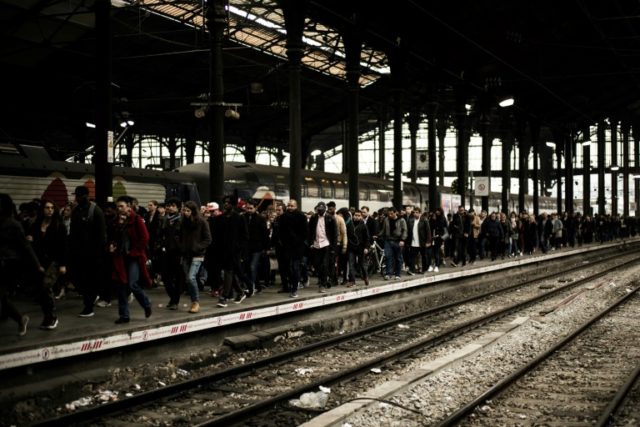Berd’huis (France) (AFP) – French President Emmanuel Macron vowed Thursday he would not back down on his plans to overhaul the state rail operator, as workers prepare a next wave of strikes that nonetheless appear to be easing off.
Speaking publicly for the first time on the three months of rolling strikes at the SNCF that began last week, Macron said he “respected” the unions and recognised their concerns.
“I understand the hours that some must work, the difficulties involved in working for a transportation company,” Macron said in an interview with TF1 television.
“I believe, as the unions do, that we need a strong rail service, a strong SNCF, and I respect their struggle,” he said.
“But I’m also asking them to fully consider the needs of our fellow citizens who have to put up with this, of the companies that could fail because of this strike,” Macron said.
“The right answer is not to abandon this reform, but to carry it out together,” he said.
“But I am going to see this through to the end.”
Unions are orchestrating stoppages for every two days out of five until at least June 28, causing extensive cancellations and disruption for the 4.5 million daily passengers on the network.
They oppose both the transformation of the SNCF into a joint-stock company whose shares would be held by the state, and a decision to deny job-for-life and early retirement guarantees for new hires.
Macron, who again told of his own grandfather’s job as a rail worker, said the company needed more flexibility for organising its operations ahead of the looming opening of the European passenger rail market to competition starting in 2020.
“This SNCF can’t work if I tell 25-year-olds today that ‘You’ll be hired under the same terms as my grandfather’ — because that’s basically what we’re telling them. It’s not workable,” Macron said.
– ‘Unfounded fears’ –
Unions have vowed to keep up the stoppages until at least June 28, warning the changes jeopardise a key public service.
As proof of public support for the strike they point to the more than 700,000 euros donated to a fund set up for the striking workers.
But an Ifop poll published Sunday showed 62 percent in favour of the government’s reforms, compared with a slim majority of 51 percent in the same survey a week earlier.
Fewer workers appear to be joining the strikes, with the SNCF saying Thursday that just 38 percent of employees necessary for train operations plan to strike Friday as the next wave of two-day stoppages gets under way.
That is down from 48 percent when the walkouts started last week.
One in three high-speed TGV and regional trains are expected to be running Friday, far less severe than previous strikes when just one in five or even one in eight TGVs were operating.
It also forecast “normal” service for Eurostar trains to and from London, and “nearly normal” for Thalys trains to Brussels, compared with several cancellations during the previous strikes.
Macron said that “passengers have already made an effort, beyond what they’re going through today — because ticket prices have risen these past few years.”
The government, for its part, has pledged to invest “10 million euros per day for 10 years” in network upgrades, “so that the trains can continue — and more so than today — arrive on time.”
Macron said the state would gradually take on some of the nearly 47 billion euros ($58 billion) of debt accrued from the development of the SNCF’s infrastructure “bit by bit, as the reforms proceed”.
He also urged unions to work “together” with the government on the SNCF overhaul, saying there was no need for “unfounded fears”.
“In Germany they made more or less the same reform. And look at what happened: better service, more people taking the train, and more regional lines,” he said.
“This reform requires an effort by everyone.”

COMMENTS
Please let us know if you're having issues with commenting.